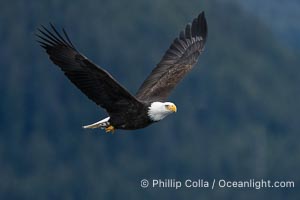
Humpback whales bubblenet feeding in Southeast Alaska. Coordinated bubble-net feeding is a specialized cooperative feeding technique used by humpback whales, where a group of whales works together to trap fish or krill in a net of bubbles then lunge through to feed.
Species: Humpback whale, Megaptera novaeangliae
Location: Sitka Sound, Alaska
Image ID: 40921
Species: Humpback whale, Megaptera novaeangliae
Location: Sitka Sound, Alaska
Image ID: 40921
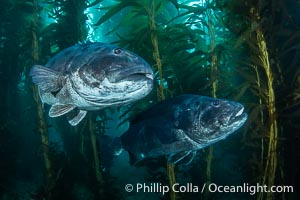
Two Giant Black Sea Bass in a Courtship Posture, in Kelp at Catalina Island. In summer months, black seabass gather in kelp forests in California to form mating aggregations. Courtship behaviors include circling of pairs of giant sea bass, production of booming sounds by presumed males, and nudging of females by males in what is though to be an effort to encourage spawning.
Species: Giant black sea bass, Stereolepis gigas
Location: Catalina Island, California
Image ID: 39432
Species: Giant black sea bass, Stereolepis gigas
Location: Catalina Island, California
Image ID: 39432
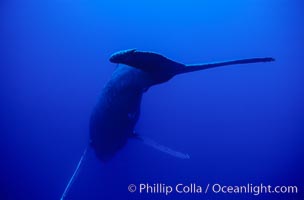
Adult male humpback whale singing, suspended motionless underwater. Only male humpbacks have been observed singing. All humpbacks in the North Pacific sing the same whale song each year, and the song changes slightly from one year to the next.
Species: Humpback whale, Megaptera novaeangliae
Location: Maui, Hawaii
Image ID: 02796
Species: Humpback whale, Megaptera novaeangliae
Location: Maui, Hawaii
Image ID: 02796
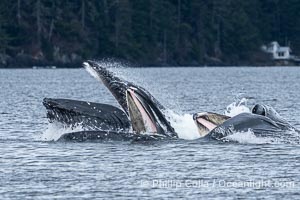
Humpback whales bubblenet feeding in Southeast Alaska. Coordinated bubble-net feeding is a specialized cooperative feeding technique used by humpback whales, where a group of whales works together to trap fish or krill in a net of bubbles then lunge through to feed.
Species: Humpback whale, Megaptera novaeangliae
Location: Sitka Sound, Alaska
Image ID: 40920
Species: Humpback whale, Megaptera novaeangliae
Location: Sitka Sound, Alaska
Image ID: 40920
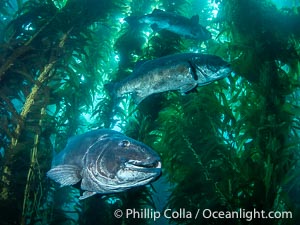
Three Giant Black Sea Bass in a Courtship Posture, Hovering One Above the Other in Kelp at Catalina Island. In summer months, black seabass gather in kelp forests in California to form mating aggregations. Courtship behaviors include circling of pairs of giant sea bass, production of booming sounds by presumed males, and nudging of females by males in what is though to be an effort to encourage spawning.
Species: Giant black sea bass, Stereolepis gigas
Location: Catalina Island, California
Image ID: 39434
Species: Giant black sea bass, Stereolepis gigas
Location: Catalina Island, California
Image ID: 39434
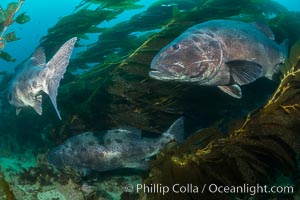
Three giant black sea bass, gathering in a mating/courtship aggregation amid kelp forest at Catalina Island. In summer months, black seabass gather in kelp forests in California to form mating aggregations. Courtship behaviors include circling of pairs of giant sea bass, production of booming sounds by presumed males, and nudging of females by males in what is though to be an effort to encourage spawning.
Species: Giant black sea bass, Stereolepis gigas
Location: Catalina Island, California
Image ID: 33355
Species: Giant black sea bass, Stereolepis gigas
Location: Catalina Island, California
Image ID: 33355
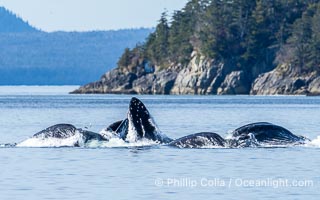
Humpback whales bubblenet feeding in Southeast Alaska. Coordinated bubble-net feeding is a specialized cooperative feeding technique used by humpback whales, where a group of whales works together to trap fish or krill in a net of bubbles then lunge through to feed.
Species: Humpback whale, Megaptera novaeangliae
Location: Sitka Sound, Alaska
Image ID: 40922
Species: Humpback whale, Megaptera novaeangliae
Location: Sitka Sound, Alaska
Image ID: 40922
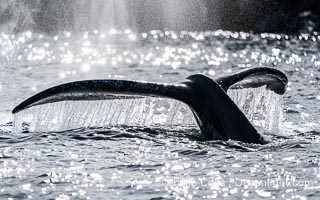
Humpback Whale Raising Fluke Before Diving in Southeast Alaska.
Species: Humpback whale, Megaptera novaeangliae
Location: Sitka Sound, Alaska
Image ID: 40949
Species: Humpback whale, Megaptera novaeangliae
Location: Sitka Sound, Alaska
Image ID: 40949
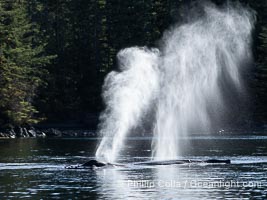
Humpback whale breath hanging in cold still air, Southeast Alaska.
Species: Humpback whale, Megaptera novaeangliae
Location: Sitka Sound, Alaska
Image ID: 40964
Species: Humpback whale, Megaptera novaeangliae
Location: Sitka Sound, Alaska
Image ID: 40964
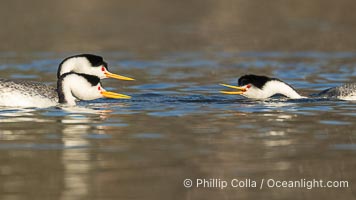
Clark's Grebes Ratchet Pointing, a courtship behavior in which the grebes assume a low facing position in the water, point beaks at one another and emit a ratchet-like sound. Coupled with dip-shaking, several rounds of ratchet pointing is often an immediate precursor to rushing.
Species: Clark's Grebe, Aechmophorus clarkii
Location: Lake Wohlford, Escondido, California
Image ID: 40891
Species: Clark's Grebe, Aechmophorus clarkii
Location: Lake Wohlford, Escondido, California
Image ID: 40891
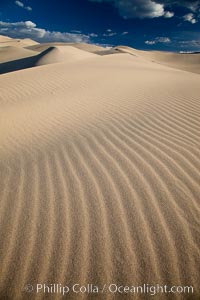
Eureka Dunes. The Eureka Valley Sand Dunes are California's tallest sand dunes, and one of the tallest in the United States. Rising 680' above the floor of the Eureka Valley, the Eureka sand dunes are home to several endangered species, as well as "singing sand" that makes strange sounds when it shifts. Located in the remote northern portion of Death Valley National Park, the Eureka Dunes see very few visitors.
Location: Eureka Dunes, Death Valley National Park, California
Image ID: 25250
Location: Eureka Dunes, Death Valley National Park, California
Image ID: 25250
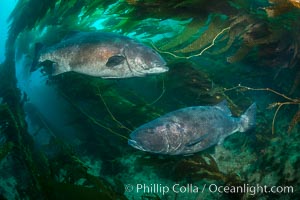
Two giant black sea bass swim in a courtship circle, part of a larger gathering of a mating aggregation amid kelp forest, Catalina Island. In summer months, black seabass gather in kelp forests in California to form mating aggregations. Courtship behaviors include circling of pairs of giant sea bass, production of booming sounds by presumed males, and nudging of females by males in what is though to be an effort to encourage spawning.
Species: Giant black sea bass, Stereolepis gigas
Location: Catalina Island, California
Image ID: 33357
Species: Giant black sea bass, Stereolepis gigas
Location: Catalina Island, California
Image ID: 33357
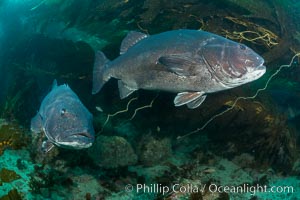
Two Giant black sea bass hover in the kelp forest as a courting pair, part of a larger mating aggregation at Catalina Island. In summer months, giant black seabass gather in kelp forests in California to form mating aggregations leading to spawning. Courtship behaviors include circling of pairs of giant sea bass, production of booming sounds by presumed males, and nudging of females by males in what is though to be an effort to encourage spawning.
Species: Giant black sea bass, Stereolepis gigas
Location: Catalina Island, California
Image ID: 33360
Species: Giant black sea bass, Stereolepis gigas
Location: Catalina Island, California
Image ID: 33360
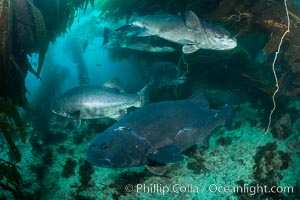
Five giant black sea bass in a mating and courtship aggregation in the kelp forest at Catalina Island. In summer months, black seabass gather in kelp forests in California to form mating aggregations leading to spawning. Courtship behaviors include circling of pairs of giant sea bass, production of booming sounds by presumed males, and nudging of females by males in what is though to be an effort to encourage spawning.
Species: Giant black sea bass, Stereolepis gigas
Location: Catalina Island, California
Image ID: 33361
Species: Giant black sea bass, Stereolepis gigas
Location: Catalina Island, California
Image ID: 33361
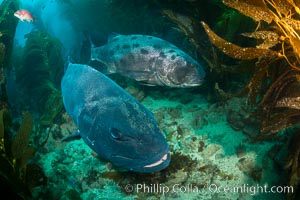
Two Giant sea bass comprise a courting pair as part of a larger mating aggregation amid the kelp forest at Catalina Island. In summer months, giant seabass gather in kelp forests in California to form mating aggregations leading to spawning. Courtship behaviors include circling of pairs of giant sea bass, production of booming sounds by presumed males, and nudging of females by males in what is though to be an effort to encourage spawning.
Species: Giant black sea bass, Stereolepis gigas
Location: Catalina Island, California
Image ID: 33362
Species: Giant black sea bass, Stereolepis gigas
Location: Catalina Island, California
Image ID: 33362
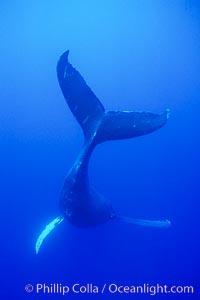
Adult male humpback whale singing, suspended motionless underwater. Only male humpbacks have been observed singing. All humpbacks in the North Pacific sing the same whale song each year, and the song changes slightly from one year to the next.
Species: Humpback whale, Megaptera novaeangliae
Location: Maui, Hawaii
Image ID: 02794
Species: Humpback whale, Megaptera novaeangliae
Location: Maui, Hawaii
Image ID: 02794
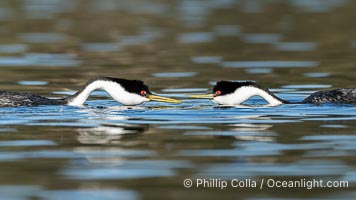
Western Grebes Ratchet Pointing, a courtship behavior in which the grebes assume a low facing position in the water, point beaks at one another and emit a ratchet-like sound. Coupled with dip-shaking, several rounds of ratchet pointing is often an immediate precursor to rushing.
Species: Western Grebe, Aechmophorus occidentalis
Location: Lake Wohlford, Escondido, California
Image ID: 40893
Species: Western Grebe, Aechmophorus occidentalis
Location: Lake Wohlford, Escondido, California
Image ID: 40893
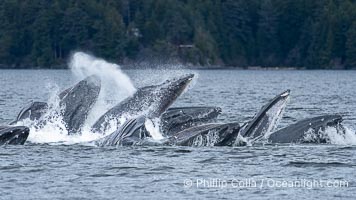
Humpback whales bubblenet feeding in Southeast Alaska. Coordinated bubble-net feeding is a specialized cooperative feeding technique used by humpback whales, where a group of whales works together to trap fish or krill in a net of bubbles then lunge through to feed.
Species: Humpback whale, Megaptera novaeangliae
Location: Sitka Sound, Alaska
Image ID: 40923
Species: Humpback whale, Megaptera novaeangliae
Location: Sitka Sound, Alaska
Image ID: 40923
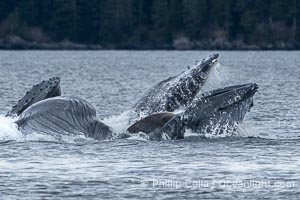
Humpback whales bubblenet feeding in Southeast Alaska. Coordinated bubble-net feeding is a specialized cooperative feeding technique used by humpback whales, where a group of whales works together to trap fish or krill in a net of bubbles then lunge through to feed.
Species: Humpback whale, Megaptera novaeangliae
Location: Sitka Sound, Alaska
Image ID: 40924
Species: Humpback whale, Megaptera novaeangliae
Location: Sitka Sound, Alaska
Image ID: 40924
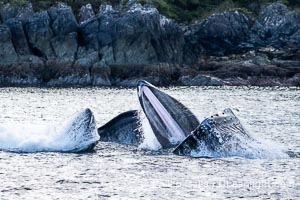
Humpback whales bubblenet feeding in Southeast Alaska. Coordinated bubble-net feeding is a specialized cooperative feeding technique used by humpback whales, where a group of whales works together to trap fish or krill in a net of bubbles then lunge through to feed.
Species: Humpback whale, Megaptera novaeangliae
Location: Sitka Sound, Alaska
Image ID: 40925
Species: Humpback whale, Megaptera novaeangliae
Location: Sitka Sound, Alaska
Image ID: 40925
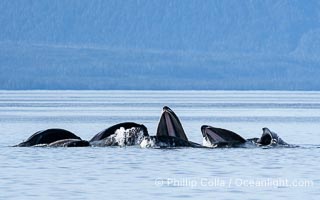
Humpback whales bubblenet feeding in Southeast Alaska. Coordinated bubble-net feeding is a specialized cooperative feeding technique used by humpback whales, where a group of whales works together to trap fish or krill in a net of bubbles then lunge through to feed.
Species: Humpback whale, Megaptera novaeangliae
Location: Sitka Sound, Alaska
Image ID: 40926
Species: Humpback whale, Megaptera novaeangliae
Location: Sitka Sound, Alaska
Image ID: 40926
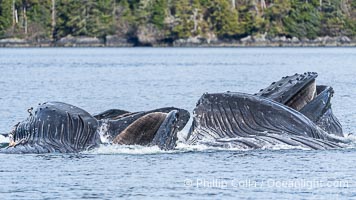
Humpback whales bubblenet feeding in Southeast Alaska. Coordinated bubble-net feeding is a specialized cooperative feeding technique used by humpback whales, where a group of whales works together to trap fish or krill in a net of bubbles then lunge through to feed.
Species: Humpback whale, Megaptera novaeangliae
Location: Sitka Sound, Alaska
Image ID: 40927
Species: Humpback whale, Megaptera novaeangliae
Location: Sitka Sound, Alaska
Image ID: 40927
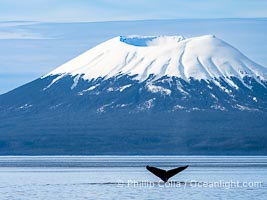
Mount Edgecumbe seen from the Sitka Sound. A volcano, Mount Edgecumbe has an elevation of 3201 feet and lies on the tip of Kruzof Island about 24 miles west of Sitka.
Species: Humpback whale, Megaptera novaeangliae
Location: Mount Edgecumbe, Sitka, Alaska
Image ID: 40956
Species: Humpback whale, Megaptera novaeangliae
Location: Mount Edgecumbe, Sitka, Alaska
Image ID: 40956
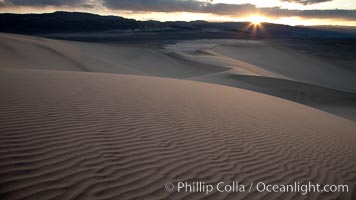
Sunset on the Eureka Dunes. The Eureka Valley Sand Dunes are California's tallest sand dunes, and one of the tallest in the United States. Rising 680' above the floor of the Eureka Valley, the Eureka sand dunes are home to several endangered species, as well as "singing sand" that makes strange sounds when it shifts. Located in the remote northern portion of Death Valley National Park, the Eureka Dunes see very few visitors.
Location: Eureka Dunes, Death Valley National Park, California
Image ID: 25240
Location: Eureka Dunes, Death Valley National Park, California
Image ID: 25240
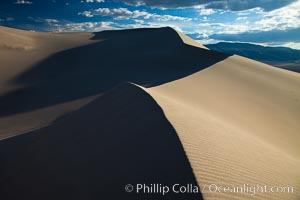
Eureka Dunes. The Eureka Valley Sand Dunes are California's tallest sand dunes, and one of the tallest in the United States. Rising 680' above the floor of the Eureka Valley, the Eureka sand dunes are home to several endangered species, as well as "singing sand" that makes strange sounds when it shifts. Located in the remote northern portion of Death Valley National Park, the Eureka Dunes see very few visitors.
Location: Eureka Dunes, Death Valley National Park, California
Image ID: 25241
Location: Eureka Dunes, Death Valley National Park, California
Image ID: 25241
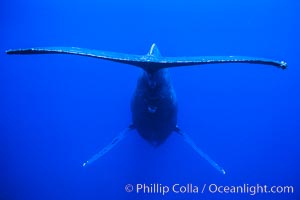
Adult male humpback whale singing, suspended motionless underwater. Only male humpbacks have been observed singing. All humpbacks in the North Pacific sing the same whale song each year, and the song changes slightly from one year to the next.
Species: Humpback whale, Megaptera novaeangliae
Location: Maui, Hawaii
Image ID: 02802
Species: Humpback whale, Megaptera novaeangliae
Location: Maui, Hawaii
Image ID: 02802
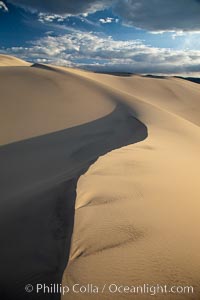
Eureka Dunes. The Eureka Valley Sand Dunes are California's tallest sand dunes, and one of the tallest in the United States. Rising 680' above the floor of the Eureka Valley, the Eureka sand dunes are home to several endangered species, as well as "singing sand" that makes strange sounds when it shifts. Located in the remote northern portion of Death Valley National Park, the Eureka Dunes see very few visitors.
Location: Eureka Dunes, Death Valley National Park, California
Image ID: 25249
Location: Eureka Dunes, Death Valley National Park, California
Image ID: 25249
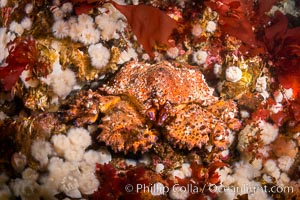
Lopholithodes mandtii Puget Sound King Crab amid a field of plumose anemones and red kelp, Queen Charlotte Strait, Canada.
Species: Puget sound king crab, Lopholithodes mandtii
Location: British Columbia, Canada
Image ID: 34348
Species: Puget sound king crab, Lopholithodes mandtii
Location: British Columbia, Canada
Image ID: 34348
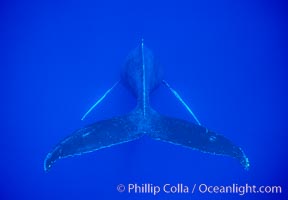
Adult male humpback whale singing, suspended motionless underwater. Only male humpbacks have been observed singing. All humpbacks in the North Pacific sing the same whale song each year, and the song changes slightly from one year to the next.
Species: Humpback whale, Megaptera novaeangliae
Location: Maui, Hawaii
Image ID: 02813
Species: Humpback whale, Megaptera novaeangliae
Location: Maui, Hawaii
Image ID: 02813
